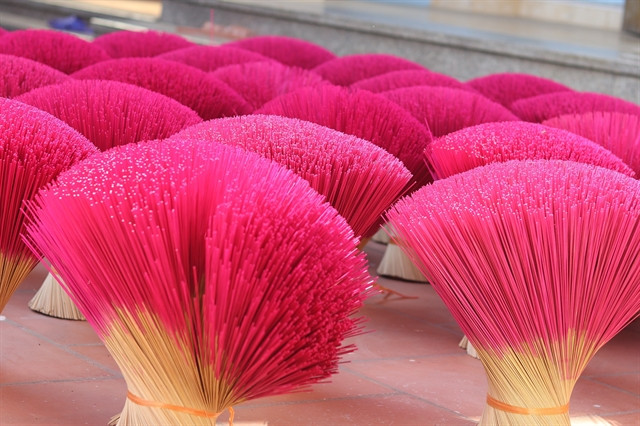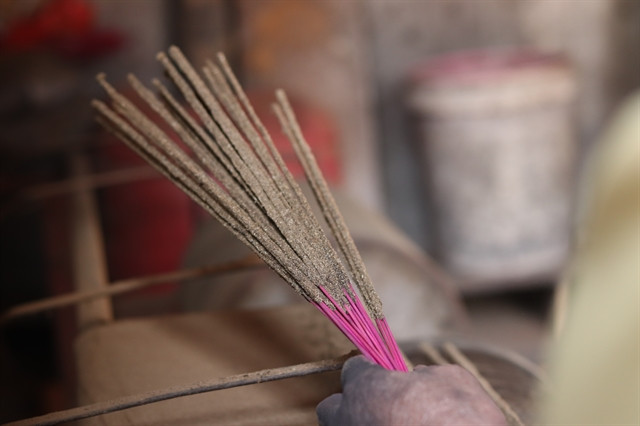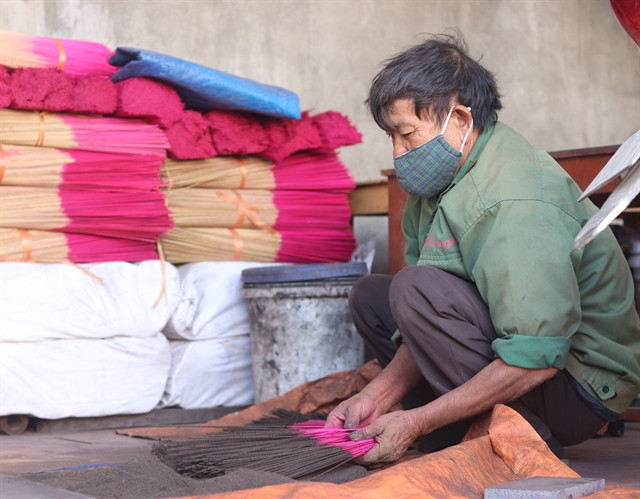 |
| Incense bundles resemble large bunches of flowers as they dry. VNA/VNS Photo Hoa Mai |
The spring festive season marks the busiest time of the year for residents of Đông Khê Village, Hoằng Hóa District in the central province of Thanh Hóa.
During these days, the village is vibrantly adorned with the red hues of incense bundles, resembling large bunches of flowers as they dry.
According to elderly villagers, the craft of making incense in Đông Khê has a history spanning over 300 years. Throughout this time, the craft village has endured and thrived due to the chemical-free quality and distinctive aroma of its products.
 |
| Đông Khê incense sticks are made entirely from natural ingredients. — VNA/VNS Photo Hoa Mai |
Used for spiritual purposes, Đông Khê incense is made with traditional manual methods. It is made entirely from natural ingredients such as flax lily, charcoal and bamboo charcoal powder, without the use of any toxic substances.
Thanks to the village's commitment to natural materials and traditional methods, Đông Khê was granted a traditional incense craft village recognition by the Chairman of the People's Committee of Thanh Hóa Province in January 2015.
Crafting the perfect incense sticks requires the meticulousness of the local craftsmen, along with their skill and experience. The distinctive fragrance of each kind of incense relies on their individual secrets of adjusting the proportions of aromatic ingredients to create the perfect blend.
 |
| Đoàn Văn Mậu has been practicing the craft for over 50 years. — VNA/VNS Photo Hoa Mai |
Đoàn Văn Mậu’s family is among local households with the longest tradition of practicing this craft – over 50 years.
“We are also one of a few families in the village engaged in year-round incense production for sale,” Mậu said.
“On average, we craft around 100,000 incense sticks per month. At the end of the year, we hire additional labourers to produce from 300,000 to 400,000 sticks to meet market demand,” he added.
Their product, Mậu Tiên Incense, has been given a three-star OCOP (One Commune, One Product) rating and is widely available in many provinces and cities from north to south, including Đắk Lắk, Gia Lai, Nam Định, Hà Nội and Bắc Ninh.
“Despite facing challenges at times, this craft has been the means of livelihood for my entire family for nearly a decade. During the months leading up to Tết (Lunar New Year), incense making brings in higher income, and sometimes we don't have enough stock to keep up with sales.”
 |
| Đông Khê incense are manually made with traditional methods. — VNA/VNS Photo Hoa Mai |
However, the artisan is also concerned about the future of his ancestor's craft.
“The younger generation no longer wishes to pursue the craft, while we, the older generation, are growing weaker. We are uncertain about the future of this traditional incense making craft,” he said.
According to Hoàng Đình Tuyên, Head of Đông Khê Village, traditional handmade incense making has not been economically effective in recent years.
From nearly 100 households engaged in incense making in 2015, there are now only 10 households.
The local authorities have been making great efforts in recent years to revive the traditional profession of Đông Khê Village.
“Hoằng Hóa District will implement initiatives to establish a craft village brand in 2024 while conducting New Rural Development Programme and tourism activities.
“The district will also open vocational training classes to teach the craft to the younger generation and ensure the outcome of the incense products, thereby guaranteeing the income and the preservation of the traditional craft of Đông Khê Village,” Tuyên said. - VNS